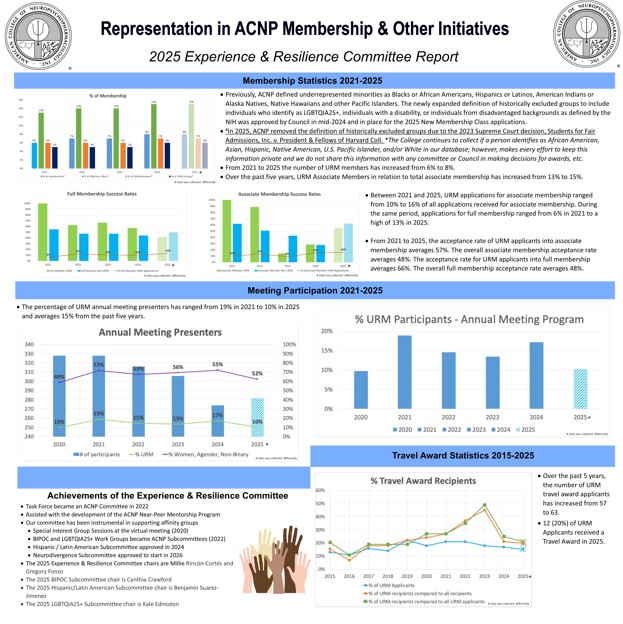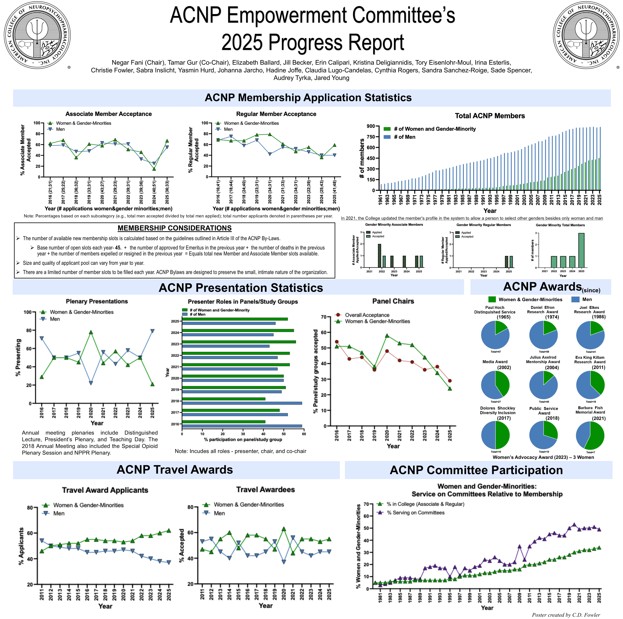Public & Media Resources/Programs & Initiatives
The ACNP has many ongoing programs and initiatives for both its members and non-members. In this section, you will find a complete compilation of official ACNP statements and task force reports as well as descriptions of our community education programs.
ACNP Initiatives
ACNP Statement on Clinical Trials Registries (PDF)
Through its official activities and the efforts of its membership, the College will work to ensure that the highest quality of science and ethics are integral to the conduct of clinical trials in our field.
Alcohol Clinical Trials Initiative (ACTIVE Workgroup) (PDF)
The mission of this workgroup is to develop consensus reviews and recommendations to improve the design, execution, and interpretation of trials of medications for the treatment of alcohol dependence. It is not the intention of the group to propose standards that would be considered as requirements for the approval of product applications by regulatory agencies, but to advance the science of clinical trials in alcoholism treatment.
Bridging the Gap with Clinical and Translational Science Awards (CTSA) (PPT)
The ACNP Liaison Committee has been working to determine how the College can assist in the effort to ensure that the neuropsychiatric research community can become more involved with CTSAs and utilize the capabilities associated with CTSAs. The attached slide set is for members to familiarize themselves with this effort and to utilize this mechanism to foster neuropsychiatric research programs specifically, as there are very few CTSAs that presently have a psychiatric focus. Click here to see a listing of ACNP Members at CTSA Institutions
Code of Conduct for Supporting Corporations (PDF)
In April 2006, The American College of Neuropsychopharmacology (ACNP) Council endorsed this Code of Conduct for its supporting corporations and their designated representatives.
Roles and Responsibilities for Supporting Corporations (PDF)
The ACNP has committed itself to establish effective, collaborative relationships with patient advocacy organizations, government, academia, and industry that help to advance the scientific goals of the College, and to serve as a catalyst for collaborative work to advance discovery and disseminate scientific advances.
How do you become an ACNP Participating Corporation? (Participating Corporation Program Guidelines) (PDF)
Corporations must apply to ACNP for participating corporation status. For information on how to apply, please reference the Participating Corporation Program Guidelines.
The Roland R. Griffiths, Ph.D., Professorship Fund
In 2006, Roland Griffiths published a paper that reinstated, and transformed, the scientific study of psychedelic drugs. His study of single doses of psilocybin in healthy adults showed that these drugs are not only amenable to scientific investigation, but they have the potential to produce positive changes in our conceptions of consciousness and human experience. Since that first study, Roland has contributed to a burgeoning research field that has implications for psychiatry, psychology, religion, political and social norms, and for fundamental human experience. Now, as Dr. Griffiths is facing a life-threatening illness, he has established an endowment to ensure the continuation of what he views as the most consequential future direction of psychedelic research: Rigorous empirical investigation of psychedelic experiences resulting in enduring positive changes in well-being and prosocial attitudes and behavior. Notably, such a project is entirely dependent on philanthropic support.
Experience & Resilience Committee 2025 Poster

Empowerment Committee 2025 Poster

Committee and Task Force Reports
2026 Experience & Resilience Symposium Slides (PDF)
2026 Empowerment Symposium Slides (Google Drive Download) (PDF)
ACNP Statement to IOM Committee on the Assessment of US Drug Safety System
Presented by Donald F. Klein, MD
SSRIs and Suicide in Youth
ACNP Task Force Report on SSRIs and Suicidal Behavior in Youth
Task Force Report on Terrorism (PDF)
The impact of terrorism on brain and brain behavior: What we know and what we need to know Apr 21, 2004
